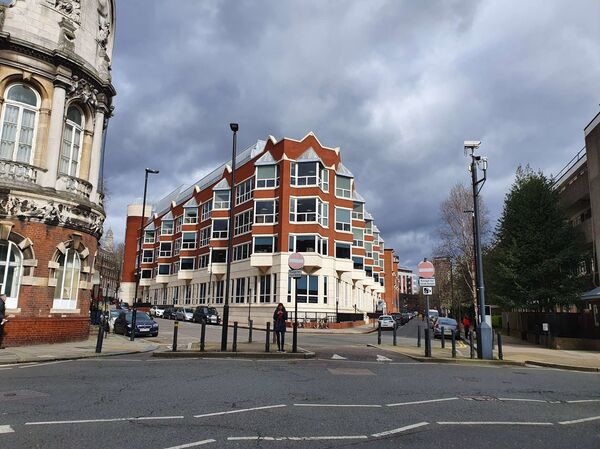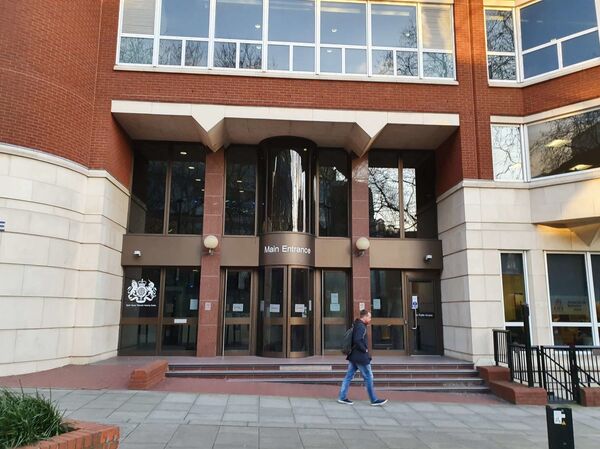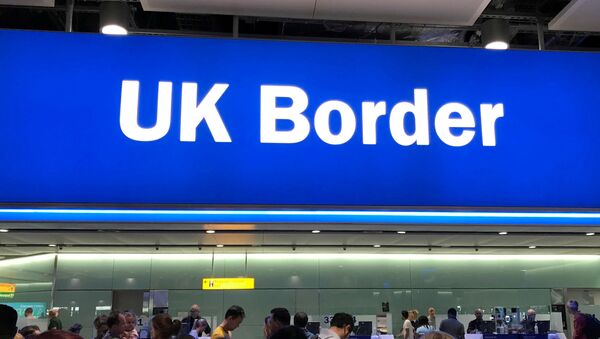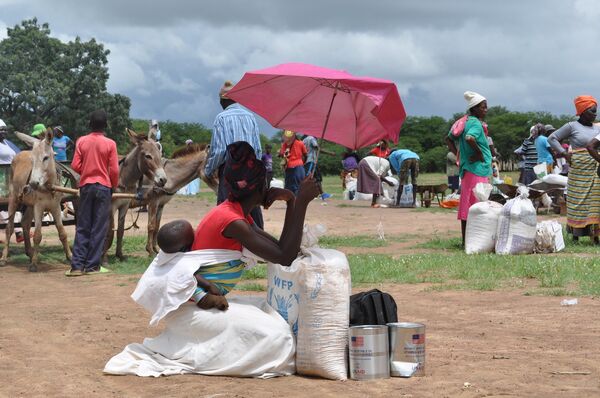A non-descript building in one of the most hipster corners of London is home to 27 “courts” where every weekday immigration judges are adjudicating on whether or not migrants can stay in or come to Britain.
The immigration tribunals are held on the second floor and on Wednesday, 26 February, it was a hive of activity with Home Office presenting officers, immigration lawyers and the appellants mingling with interpreters speaking Kurdish, Urdu, Bengali, Amharic, Shona, Lingala, Portuguese and Latin American Spanish.

Just after 10am Judge Elizabeth Ruddick in Court 23 began hearing her first case of the day.
The Teenage Daughter In Zimbabwe
Norma Dube, 43, came to the UK in 2002 as a refugee from Robert Mugabe’s Zimbabwe but left her infant daughter, Amanda Ncube, behind in Bulawayo, the country’s second biggest city.
Ms Dube now lives in Nottingham and holds down two jobs - as a carer and a customer care assistant - in order to send enough money back to Zimbabwe where her elderly mother looks after her daughter.
Five days before Amanda turned 18 Ms Dube submitted an application to the Home Office for her to come and live with her in Nottingham.
Judge Ruddick’s task was to decide whether Ms Dube had proved she had sole parental responsibility for Amanda, who is now 19 and lives with her 75-year-old grandmother.
The presenting officer, Cherreem Lindsay, slowly and precisely cross examined Ms Dube, who was wearing a smart blue suit, about the statement she had given to the Home Office about Amanda.
Ms Lindsay asked her: “What family do you have in Zimbabwe besides your daughter?”
“My mum,” replied Ms Dube.
But a few minutes later she admitted she had a sister, who lived in Harare, and a son, 22-year-old Dumlisani, who was at university in the town of Gweru.
Ms Lindsay asked: “Is there any reasons why your statement is silent about you having another child?”
“I don’t know why it’s silent but I have always mentioned him. His application (to come to England) is ongoing,” replied Ms Dube.
She was then quizzed about various WhatsApp messages between herself and Amanda, which had been presented by her lawyer as proof of the “emotional support” she gave her daughter as well as the financial support.
Far too many immigration tribunal decisions are of poor quality and it’s difficult to see the biggest problem in the system atm as the Upper Tribunal being too free & easy in giving appellants the chance to overturn them https://t.co/FoYYGlahQM
— Alasdair Mackenzie (@AlasdairMack66) February 26, 2020
These included references to Amanda being accused of stealing £200 from her grandmother and also mention of her being offered “weed” by her cousin.
She was then asked why she had chosen to wait until five days before Amanda turned 18 - when she would no longer have been considered a child and able to join her mother in England.
Ms Dube said: “I tried it in 2016 but the lawyers didn’t send the form…I was busy working and trying to save money. I realised she wanted to come here. There was a lot of peer pressure and she had depression.”
A clearly emotional Ms Dube said: “Every time I speak to my mum she tells me some thing about my daughter and what she has done. I can’t choose between my mum and my daughter.”
In January this year the Home Office received a letter from Ms Dube’s mother’s doctor in Zimbabwe who said she suffered from serious heart problems and her health had deteriorated considerably since 2017.
When Ms Dube had regained her composure she continued: “My siblings blame me. I keep thinking my mum is going to die because of my daughter.”
She said Amanda had no contact with her biological father - who abandoned her when she became pregnant - or his family but Ms Lindsay pointed to text messages which suggested otherwise.
She then asked Ms Dube if Amanda’s father had consented to her coming to the UK.
“He hasn’t because he’s not involved in the child’s life. I don’t know if he is in jail. He pops up when he wants to,” Ms Dube said.
When Ms Dube’s evidence was concluded her lawyer and Ms Lindsay made their closing submissions.
Ms Lindsay said: “My submission is that this applicant has not been a credible witness. She has not been truthful about her relationship with family members. Her son Dumlisani was not mentioned in her statement and she has not been truthful about the level of contact her daughter has with her father.”
We are proud to announce Elizabeth Ruddick's appointment as a fee paid Judge, sitting in the First Tier Tribunal (Immigration and Asylum Chamber).
— Wilson Solicitors (@WilsonsLondon) January 25, 2019
Congratulations, Elizabeth, we wish you every success in your appointment.#Immigration #Humanrights https://t.co/4h2tQ9EYG8 pic.twitter.com/YnjL4iGEUc
Judge Ruddick, who was born in the US and has been working in the UK since 2007, said there was evidence of “a lot” of emotional as well as financial support.
She added: “Any parent who is away from her child has to share parental responsibility. The fact that she delegated parental responsibility (to her mother) is not a killer point.”
But Judge Ruddick said there were “credibility implications” about Ms Dube’s evidence.
She then told Ms Dube she would make a decision and send it to her in the post “in the next few weeks.”
The Elderly Couple And Their Disabled Son From Gujarat
Just before lunch Judge Ruddick moved onto the case of Ismail Noor, 72, his wife Hasina, 77, and their son Javed, 42.
They came to the UK in October 2018 for a “holiday” but decided not to return to their home in Gujarat - the home state of Indian Prime Minister Narendra Modi - after Mrs Noor’s knee began troubling her.
Mrs Noor, who was in a wheelchair, and her husband spoke with the help of a Gujarati interpreter.
Mr Noor, bearded and wearing traditional Muslim garb, said he was a retired tailor who had a chronic back problem which meant he was unable to care for Javed, who had been severely disabled since birth and was unable to shower or go to the toilet on his own.
Mr Noor said they came to visit their daughter, Shahin - who moved to London 20 years ago - in 2018 but when his wife’s knee flared up they realised they would not be able to return to India because there was nobody to care for them there. In 2019 they applied for Right To Remain in the UK.
Mr Noor, who said he had no pension, said he had been relying on financial support from his nephew, Soyeb Noor, and his wife Najmabanu, for several years.
Mr Noor said his house in Gujarat had been “locked up” since they left but a family friend had been given keys and came in to clean it once a month.
Cherreem Lindsay, again presenting the case for the Home Office, pointed out inconsistencies between Mr and Mrs Noor’s description of their home in Gujarat. She probed Mr Noor’s back problem and asked what medication he had been prescribed for it.
“Paracetamol,” he said, adding: “I get a lot of pain when it wears off.”
Ms Lindsay pointed out there was no mention of his back problem in the letter sent to the Home Office by his doctor and she asked Mr Noor: “Was the intention to ever return to India when you came in 2018?”
Mr Noor said they intended to go back until his wife became unable to walk because of her knees.
“We got very scared and we talked to the family and they said we can stay here and the family will help,” said Mr Noor.
When Soyeb Noor gave evidence he was asked by the family’s lawyer, Joseph Byrne: “Are you happy to make a declaration that you will provide accommodation for the three of them without recourse to the public purse for three years?”
He said he was and explained that although he was willing to financially support his relatives even if they were sent back to India the problem was that they simply could not find a carer to look after Javed.
Ms Lindsay asked why the family could not pay a carer to look after Javed when they returned to India.
“It’s very difficult to find 24 hour care. Javed will not allow a stranger to look after him,” said Soyeb Noor.
Najmabanu Noor was asked about the knee replacement surgery that Mrs Noor had been told she needed.
She said they would be prepared to pay for it privately but admitted she did not know how much it would cost.
Ms Lindsay asked: “So how do you know you can afford it?”
“I work. My husband works. My son works. Whatever the cost we will bear it,” she said.

When the evidence was concluded the two lawyers summarised their cases.
Ms Lindsay again said Mr and Mrs Noor were not “credible witnesses” and she said: “It’s clear that the intention was not to return to India when they came here and there was no forethought about what would happen if the elderly parents could not care for Javed. I don’t see how they would not be able to avoid recourse to the public purse.”
Mr Byrne responded: “They came here in good faith and have not misused the NHS.”
Judge Ruddick then said: “Nobody ever made a long-term plan (in this case). For the past 40 years it must have been clear. Everyone knows that when people get older they will not be able to care for their son. What weight should I put on that?”
Indian Muslims are being killed in the streets of Delhi in scenes resembling the violence witnessed in Gujarat (2002), Mumbai (1992) & Delhi (1984).
— Zarah Sultana MP (@zarahsultana) February 26, 2020
Dozens have died & hundreds injured.
Let’s be clear: These aren’t “clashes”. This violence has been whipped up by Modi & the BJP.
She said: “She (Shahin) left knowing her parents were caring for her brother and there was no indication of what would happen. They said that nobody discussed it. I don’t find that plausible.”
Mr Byrne said Javed had been “in his mother’s pocket” his whole life and he reacted angrily and aggressively to strangers.
He said the suggestion that the woman who cleaned their house in Gujarat could be persuaded to provide “intimate care” was not reasonable.
Mr Byrne said: “The suggestion is that if they offered her enough money she’d be willing to wipe his bottom etcetera. Javed does know her but she is a woman and above all she does not want to do it.”
Judge Ruddick said the case hinged on the rules on Adult Dependent Relatives, which were reviewed in 2016.
She told the Noor family she would go away and make her decision and they would receive it in the post in a few weeks’ time.
The Uber Driver With Family In India
Just after 4pm Judge Ruddick was finally ready for the case of a London Uber driver, Mr Hussain, who wanted to bring his wife and three children over from India.
The Home Office claim the couple are no longer married and have also doubted Mr Hussain is the children’s father but he has not been able to arrange DNA tests.
In the absence of the “respondent’s bundle” of documents and with queries about Mr Hussain’s income, Judge Ruddick adjourned the case as part heard.
This was just a snapshot of one judge's work on one day in one immigration tribunal building - there are a dozen others up and down the country - but it gave a fascinating insight into the challenges facing the Home Office in assessing the claims of would-be migrants. Now that Britain has left the European Union the immigration tribunals could get even busier with EU nationals being added to the list of people who do not have an automatic right to live in the UK but want to join relatives already in Britain.






